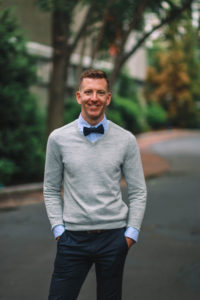On Apologies and Accountability
The editor reflects on and holding institutions, and the people who run them, accountable
 Dear Revealer readers,
Dear Revealer readers,
With Yom Kippur on the horizon, I have been thinking about apologies and accountability. According to the Jewish tradition, a person must seek out anyone they wronged in the past year to ask for forgiveness before Yom Kippur, the Day of Atonement. According to the rabbis, not even God has the power to forgive someone for something they did to another person; only the aggrieved can grant forgiveness. But the rabbis also teach that no one is required to forgive if they do not believe an apology is genuine or if they do not think the harmful behavior will cease.

Revealer Editor, Brett Krutzsch
I was reflecting on these ideas while I followed coverage of the Parliament of World Religions that took place a few weeks ago in Chicago. The event is a gathering of religious leaders from around the globe; the first such assembly took place in 1893. At this year’s conference, several people came together for a ceremony to repent for what humans have done to the planet. They offered prayers, engaged in rituals, and vowed to address the climate crisis. But, unsurprisingly, no one was at the ceremony who could receive the apology. And, really, who could take on that role? Children who will grow up on a different planet because of the climate crisis? Families who have lost loved ones to wild fires, extreme heat, or hurricanes? And just as there was no one to receive the group’s repentance, the clergy’s vows to combat climate change lacked what we desperately need, namely action from CEOs, government leaders, and large institutions. Reducing individuals’ carbon foot print, while worth cutting wherever possible, will not save us. We need to hold corporations and politicians accountable and demand large-scale action. They owe the apologies and they need to change their destructive behaviors. And none of us should be in a rush to grant them forgiveness.
With these thoughts in mind, this issue of The Revealer is about holding institutions, and the people who run them, accountable. The September issue opens with the newest installment of Kaya Oakes’s “Not So Sorry” column with “What Makes an Apology Worthwhile,” where she questions if the apologies offered by the Vatican and the Southern Baptist Convention over decades of abuse suggest that things will change in the future. Next, in “Catholic Fascists in the NYPD, 1939-1940,” Klaus Yoder looks at the relationship between religion, rightwing militias, and police departments and what a concerning incident from New York City’s police department decades ago can teach us about today. Then, in “I Want to Be Haunted by the Ghost,” Jack Downey offers an obituary of Sinéad O’Connor and reflects on her relationship with religion and her determination to hold institutions responsible for their sins. After that, in “Homegoing,” Lynne Gerber interviews Ashon Crawley about Crawley’s exhibit at the National Mall that honors the people that many churches condemned: Black, queer musicians with AIDS. Following that, in “Songs of Zion,” Mari Joerstad considers how a biblical passage, Psalm 137, might help us think about the connections between white supremacy and violence against children. And, in “Spiritual Reproductive Services,” an excerpt from the book Sacred Pregnancy, Ann W. Duncan explores how pregnant people are seeking out support that they aren’t finding in traditional medical or religious communities.
The September issue also includes the newest episode of the Revealer podcast: “The Spiritual Birthing Movement.” Ann Duncan joins us to discuss the organizations and businesses that imbue pregnancy with a sense of the sacred. We explore what these groups offer pregnant people that they aren’t finding in conventional medical settings or traditional religious communities, how they use rituals to help people cope with pregnancy, parenting, and the loss of a child, and what the presence of these companies reveals about social inequalities among pregnant people throughout the United States today. You can listen to this episode on Apple Podcasts and Spotify.
As Yom Kippur approaches, I find myself thinking about one more aspect of the day. While in synagogue, Jews across the world will recite the Viddui prayer, a long public confession. Strikingly, the prayer is not written in language of individual atonement. Instead, most of the prayer is in the first-person plural: “We have sinned by…” The ancient rabbis wanted to instill the idea that our lives are intertwined. Each person may not have done everything mentioned in the prayer, but we exist as a collectivity and the rabbis believed we should hold one another accountable in order to repair what is broken in the world. A similar lesson can be found in several of the articles in this issue. Whether it is religious communities that have covered up abuse, government entities that have overlooked rightwing infiltration in policing, or media that reinforces white supremacy, we must consider if we played a part in supporting those institutions, how we can hold them accountable, and what we should do if they do not correct their damaging ways. These are difficult, but necessary, things to do. And, so, I close with something the rabbis wrote in the Talmud: “It is not incumbent upon you to finish the task of repairing the world. But neither may you refrain from starting it.”
Yours,
Brett Krutzsch, Ph.D.